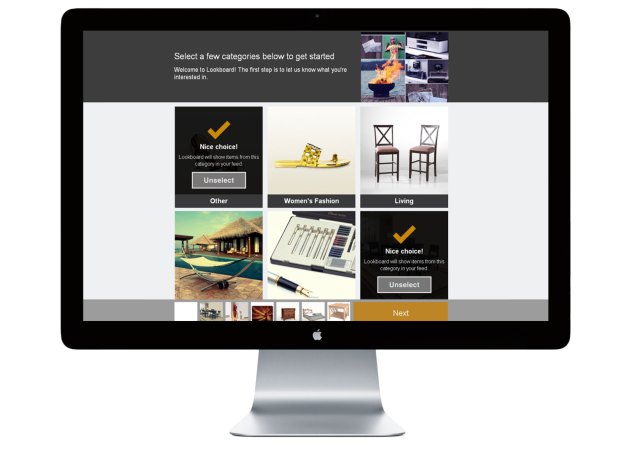A startup called Lookboard is hoping to bridge the gap between e-commerce retailers and small-scale suppliers by functioning as an online wholesale catalogue. The site aims to simultaneously streamline the buying process and expose merchandisers to a broader range of products than they might be able to track down on their own, while giving traction to designers who might otherwise go unnoticed.
Daily deals sites like Zulily, No More Rack, Living Social and Nordstrom's HauteLook are some of Lookboard's biggest buyers, which has also gained traction with more discovery-focused sites like Fab. The sellers are lesser-known designers spanning categories, such as home decor, women's and men's clothing, art, tech, jewelry and food.
Lookboard treats the buyer like a consumer, and the experience of searching for products by keyword and category is not unlike any other e-commerce site. When a buyer signs up, they take a photo-based quiz in order to determine their taste, which filters the products they are shown. They curate collections, and over time Lookboard's taste algorithm further refines its suggestions based on the items they select.
The site also has a number of tools for retailers, including a collaboration feature similar to Google Docs and gives multiple people a space to work on the product lineup. Most importantly, Lookboard allows commerce sites to export Excel files of standardized product information and high-resolution images without having to start an email thread with the vendor.
Since it fully launched in March, Lookboard has signed up 3,000 buyers and 4,800 sellers, with over 50,000 products available. The company will be raising a $1 million seed round in the near future and has begun talking with several investors, founder and CEO Duy Huynh tells me.
"It takes a lot of time to work with a vendor, getting product info and asking them to send high-res images," Huynh says, "and the buyer often gives up on the vendor about that. We streamlined the process into one place, so the buyer can click the button and export it into their data feed."
E-commerce buyers purchase products on the site, and the vendor fills the incoming order and ships it to them. Lookboard marks up products 10 percent from wholesale to the buyer's purchasing price, a structure that Huynh said has yet to present any problems. The site has done $400,000 in revenue to date, at a monthly rate of about $40,000.
Lookboard is free to sellers, in order to reduce friction in its adoption. Huynh added that they have deliberately kept the Lookboard dashboard simple on the vendor side, because suppliers are often not very tech savvy, so much so that many still track their inventory on pen and paper. Sellers set up a storefront on which they can update their inventory and pricing daily, and each product is given a unique URL.
"If you look at a retailer today, to source products you have to hire five to 10 merchandisers or buyers," Huynh said. "Then they have to travel to trade shows. It takes over six months to find products, which will cost hundreds of dollars. We streamline that entire process of sourcing products into one single line of code."
Outside of helping e-commerce sites find more products faster, Lookboard gives small designers visibility, especially when they're trapped in the limbo of being too big for Etsy but too small to have built any name recognition or major retailer relationships. Commerce sites like AHAlife have sought to bring these kinds of makers to the public eye, too, but they do so through curation.
What Lookboard is offering is a more democratic way of putting sellers in front of buyers. Does that mean that every brand will get picked up by a retailer? Of course not. But it gives them a better shot.

No hay comentarios:
Publicar un comentario